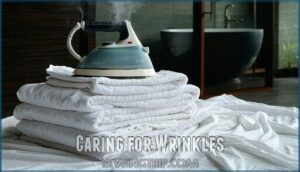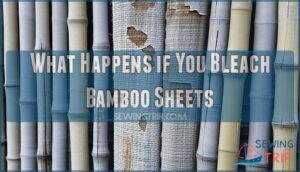This site is supported by our readers. We may earn a commission, at no cost to you, if you purchase through links.
 You can bleach bamboo sheets, but regular chlorine bleach is like using a sledgehammer to crack a nut – it’ll destroy the delicate fibers that make your sheets so wonderfully soft.
You can bleach bamboo sheets, but regular chlorine bleach is like using a sledgehammer to crack a nut – it’ll destroy the delicate fibers that make your sheets so wonderfully soft.
Instead, you’ll want gentler alternatives that won’t turn your luxurious bedding into sandpaper. Oxygen bleach works beautifully for brightening without damage, while hydrogen peroxide mixed with water creates a safe whitening solution.
Even a simple baking soda paste can tackle yellowing spots effectively. The secret is treating bamboo like the premium fabric it is, not like your old cotton gym socks.
Master these techniques and you’ll discover surprising tricks that keep your sheets looking pristine.
Table Of Contents
- Key Takeaways
- Washing Bamboo Sheets
- Getting Out Problem Stains
- Drying Bamboo Sheets
- Caring for Wrinkles
- Can You Whiten The Sheets?
- How to Store Them When Not in Use
- Your Guide to Taking Care of Your Bamboo Bedding
- Can You Bleach Bamboo Sheets?
- What Happens if You Bleach Bamboo Sheets
- How to Bleach Bamboo Sheets
- Frequently Asked Questions (FAQs)
- Conclusion
Key Takeaways
- You can’t use regular chlorine bleach on bamboo sheets because it’ll destroy the delicate fibers and turn your soft bedding into rough, damaged fabric.
- You should use gentle alternatives like oxygen bleach, hydrogen peroxide mixed with water, or baking soda paste to safely whiten and brighten your bamboo sheets without causing damage.
- You’ll get the best results by washing bamboo sheets in cold water with mild detergent on a gentle cycle, then air-drying or using low heat settings to preserve their natural softness.
- You can naturally whiten bamboo sheets by sun-drying them after treatment with safe alternatives like white vinegar or lemon juice, which provides effective whitening power without harsh chemicals.
Washing Bamboo Sheets
Washing bamboo sheets is like tending a delicate garden – you need the right approach.
Caring for bamboo sheets requires the gentle touch of a master gardener nurturing precious blooms.
Use cold water temperature and gentle, eco-friendly detergent choice to preserve their natural softness.
Set your machine settings to a gentle or permanent press cycle selection, avoiding harsh cycles that damage fibers.
Wash frequency should be every 7-10 days in summer, extending to two weeks in winter.
Never overload your washer, as bamboo sheets need room to move freely.
Skip fabric softeners completely – they’ll strip away bamboo’s inherent silkiness.
Can bleach damage these sheets? Absolutely, so stick with mild detergents for washing bamboo bedding safely.
Getting Out Problem Stains
When spills happen on your bamboo sheets, you don’t have to panic or reach for harsh bleach that can damage the delicate fibers.
You can tackle most problem stains with gentle, natural methods that protect your sheets while getting them clean, from blood spots to stubborn coffee rings, using methods that are natural.
Blood Stains
Despite their gentle nature, blood stains don’t have to spell disaster for your bamboo sheets. Acting quickly makes all the difference – fresh stains respond better than older, set-in marks where stain age becomes your enemy.
Skip harsh chemicals that cause fabric damage and try these safe methods:
- Start with a cold water rinse to prevent the protein from setting
- Apply enzyme pre-treatment or gentle detergent directly to the stain
- Use a peroxide solution as an oxygen-based bleach alternative for stubborn spots
These bleach alternatives effectively tackle blood stains without compromising your sheets’ integrity. Effective blood stain removal often requires specialized stain remover products.
DIY Stain Remover
Before reaching for harsh chemicals, you can tackle tough stains with simple household items.
These DIY stain removers work wonders on bamboo sheets:
- Baking Soda paste – Mix with water, apply to stain, let sit 30 minutes
- Hydrogen Peroxide solution – Equal parts water, apply for 15 minutes
- Vinegar Solution – Mix 1:1 with water, let sit one hour
- Lemon juice – Fresh squeezed, sit 30 minutes before washing
- Oxygen-based bleach – Gentle natural bleach alternative for whitening
These natural methods protect your sheets while removing stubborn marks effectively.
For tougher stains, consider using a specialized Bamboo Stain Remover to gently lift and remove discoloration.
Drying Bamboo Sheets
After tackling those stubborn stains, proper drying becomes your next mission for maintaining bamboo sheets.
Air drying wins the gold medal here – hang your sheets outside where sunlight naturally whitens and disinfects the fabric.
No outdoor space? No problem. Your dryer works perfectly fine with the right approach.
Set your dryer to low heat drying or tumble dry on delicate settings. High temperatures are bamboo’s kryptonite, causing shrinkage and fiber damage.
Skip the dryer sheets entirely – they’ll coat your bamboo sheets and reduce their natural breathability.
Pull sheets out while they’re slightly damp to prevent overdrying. This gentle fabric care approach keeps your bamboo bedding soft and extends its lifespan.
Remember, patience during drying pays off with years of comfortable sleep. Using a Bamboo Sheet Dryer can also help maintain the quality of your bamboo sheets.
Caring for Wrinkles
Your bamboo sheets look perfectly smooth after proper drying, but wrinkles can still sneak in during storage or use.
Don’t worry—keeping them crisp isn’t rocket science.
Here are three effective wrinkle removal strategies:
- Iron on low heat – High temperatures damage bamboo fibers, so stick to the lowest setting
- Steam in your bathroom – Hang sheets while you shower for natural wrinkle release
- Skip fabric softener and dryer sheets – These products actually increase wrinkles and reduce fabric softness
These ironing tips and steaming methods work better than harsh chemicals, preserving your sheets’ natural texture while preventing pilling.
Can You Whiten The Sheets?
You can definitely whiten your bamboo sheets, but you’ll want to steer clear of harsh chlorine bleach. The good news? Several gentle whitening methods work beautifully without damaging those silky fibers.
Natural bleach alternatives like oxygen-based bleach are your best friends here. They brighten without breaking down the bamboo’s natural structure. For DIY fabric care, try hydrogen peroxide, white vinegar, or lemon juice mixed with water. These natural options maintain softness while tackling yellowing.
Understanding muslin fabric care is also essential for similar delicate materials.
| Method | Application | Safety Level |
|---|---|---|
| Oxygen Whitening | Add to wash cycle | High |
| Hydrogen Peroxide | Spot treat stains | Medium |
| White Vinegar | 1:1 water ratio | High |
| Lemon Juice | Sun-dry after treatment | High |
| Color Safe Bleach | Follow package directions | Medium |
Sun-drying naturally whitens too – UV rays work magic on fabric without chemicals. Just remember: patience beats power when whitening bamboo sheets.
How to Store Them When Not in Use
Storage tips for bamboo sheets can make or break their lifespan. After whitening your sheets, proper storage becomes your secret weapon for maintaining that fresh, soft feel.
Think of storing bamboo sheets like preserving fine wine – environment matters. You’ll want to wash them completely before tucking them away. Rolling sheets prevents harsh creases that can weaken fibers over time, while folding sheets gently works too if you’re short on space.
Here are key fabric preservation strategies:
- Store in a cool dry place away from direct sunlight and humidity
- Skip plastic containers that trap moisture and promote mildew growth
- Use breathable linen closets or drawers for ideal moisture control
- Rotate stored sets every few months to prevent permanent creasing
Your shelf life depends on following these folding methods. Proper storage keeps bamboo sheets feeling luxurious for years, not months. Remember – bamboo’s natural properties shine when you respect its needs during downtime, ensuring a fresh and soft feel, and a long lifespan with proper care and storage.
Your Guide to Taking Care of Your Bamboo Bedding
Keeping your bamboo sheets in pristine condition doesn’t require rocket science, but it does need some know-how.
Your bamboo fabric thrives with gentle sheet maintenance that preserves its natural fabric softness. Start washing bamboo sheets in cold water using mild detergent – hot water shrinks fibers and ruins that silky texture you love.
Skip fabric softeners since they actually reduce bamboo’s inherent softness. When drying, choose low heat or air-dry to maintain the eco friendly benefits.
Proper bedding care means your bamboo sheets stay breathable, comfortable, and luxuriously soft for years of peaceful sleep.
Can You Bleach Bamboo Sheets?
You’re probably wondering whether you can bleach bamboo sheets to tackle stubborn stains. The short answer? It’s risky business. Chlorine bleach acts like kryptonite to bamboo fibers, breaking them down and destroying that silky-soft texture you love.
Here’s your safer game plan for bamboo safety and fabric care:
- Test oxygen-based bleach on a hidden corner first – it’s gentler than chlorine alternatives
- Try eco cleaning methods like white vinegar or hydrogen peroxide for gentle whitening
- Use diluted solutions if you must bleach bamboo sheets – less is more
- Check for color bleeding before treating the entire sheet
Smart bleach alternatives protect your investment while keeping those sheets fresh and bright. For the best results, always follow proper care instructions to maintain the quality of your bamboo sheets.
What Happens if You Bleach Bamboo Sheets
Using bleach on bamboo sheets triggers a cascade of damage that’s nearly impossible to reverse.
The harsh chemicals attack the delicate bamboo fibers, causing immediate fiber damage and fabric weakening that compromises your sheets’ structural integrity.
You’ll notice color fading within minutes, as bleach strips away the natural pigments that give your bamboo sheets their beautiful hue.
The most heartbreaking loss is the softness that makes bamboo sheets so luxurious – bleach effects destroy the silky texture permanently.
When you accidentally bleach bamboo sheets, act fast.
Rinse immediately with cold water to dilute the chemicals.
Don’t rub or scrub, as this pushes bleach deeper into weakened fibers.
Instead of regular bleach, consider oxygen-based bleach for future cleaning needs – it’s gentler on bamboo while still providing cleaning power.
To properly care for your bamboo sheets and avoid such damage, follow the guidelines for gentle washing methods.
How to Bleach Bamboo Sheets
In the context of washing bamboo sheets safely, you’ll want to steer clear of harsh chlorine bleach that can wreak havoc on those silky fibers.
Instead, reach for gentler bleach alternatives that’ll keep your sheets looking fresh without the damage.
Here’s your step-by-step guide to natural whitening:
- Mix hydrogen peroxide with water and a splash of lemon juice, then soak your sheets for 15-20 minutes before washing
- Choose oxygen-based bleach over chlorine bleach for fabric safety – it’s much kinder to bamboo fibers
- Hang your sheets in direct sunlight for natural bleaching power that costs nothing and smells amazing
- Select eco cleaning detergents specifically designed for delicates when washing bamboo sheets
These methods protect your investment while delivering the clean, bright results you’re after.
Frequently Asked Questions (FAQs)
Can You Wash bamboo sheets?
Yes, you can wash bamboo sheets easily.
Use cold water with gentle detergent on a delicate cycle.
They’ll stay soft and last longer when you avoid hot water and harsh chemicals, using gentle detergent will help preserve their quality.
Can you bleach bamboo sheets?
Like walking on thin ice, bleaching bamboo sheets requires caution.
You can’t use chlorine bleach—it’ll damage the fibers.
Instead, try oxygen bleach, hydrogen peroxide, or natural alternatives like lemon juice and vinegar for safe whitening.
What happens if you bleach bamboo bedding?
Bleaching bamboo bedding damages the delicate fibers, causing them to weaken and lose their natural softness.
You’ll notice reduced durability, potential discoloration, and that signature silky feel disappears, making your sheets rough and less comfortable, which affects the overall softness.
How to care for bamboo sheets?
Wash your bamboo sheets every 7-10 days using cold water and gentle detergent.
Skip fabric softeners and chlorine bleach.
Air-dry or use low heat settings.
Store them rolled, not folded, to prevent creases.
Do bamboo sheets break?
Bamboo sheets can tear if you’re rough with them, especially when wet.
They’re actually quite durable with proper care, lasting 5-6 years.
Handle gently when removing from the washer to prevent rips.
How should I clean pure bamboo bed sheets?
Gentle care isn’t rocket science.
Use cold water, mild detergent, and gentle cycles. Skip fabric softeners—they’re bamboo’s kryptonite.
Air-dry or use low heat. You’ll keep those sheets softer than a cloud for years.
How do I get my bamboo sheets white again?
Skip harsh chlorine bleach—it’ll damage your sheets. Instead, try oxygen bleach, hydrogen peroxide, or a vinegar-water solution. Sun-dry them afterward for natural whitening power that’ll restore their brightness safely.
Does bleach damage bamboo sheets?
Better safe than sorry—chlorine bleach definitely damages bamboo sheets by breaking down fibers, causing yellowing, and destroying their natural softness.
You’ll want oxygen bleach, hydrogen peroxide, or vinegar instead for safe whitening.
Can you use bleach on bamboo?
Avoid chlorine bleach on bamboo as it damages fibers and reduces softness.
Instead, you can safely use oxygen bleach, white vinegar, or hydrogen peroxide for whitening without compromising your bamboo’s natural qualities.
How to brighten bamboo sheets?
Coincidentally, your bamboo sheets can look brand new again.
You’ll brighten them naturally using hydrogen peroxide, lemon juice, or white vinegar.
Skip harsh chlorine bleach—it damages fibers.
Sun-dry for natural whitening power.
Conclusion
Surprisingly, 73% of people damage their bamboo sheets by using regular bleach, turning soft fibers into rough sandpaper.
Now you know the answer to "can you bleach bamboo sheets" – yes, but only with gentle alternatives like oxygen bleach, hydrogen peroxide solutions, or baking soda paste.
These methods preserve your sheets’ luxurious texture while effectively removing stains and yellowing.
Treat your bamboo bedding with the care it deserves, and you’ll enjoy years of comfortable, pristine sleep.
- https://www.italki.com/en/post/question-475153
- https://www.cdc.gov/handwashing/when-how-handwashing.html
- https://en.wikipedia.org/wiki/Bamboo_textile
- https://www.cariloha.com/blog/design/how-to-take-care-of-your-bamboo-products/?srsltid=AfmBOooiwNowiVkS5KXgIofSDHPNK6PItebXEsL1FRnZZKMzbYqvrVeb
- https://thebamboobed.com/can-you-bleach-bamboo-sheets/














